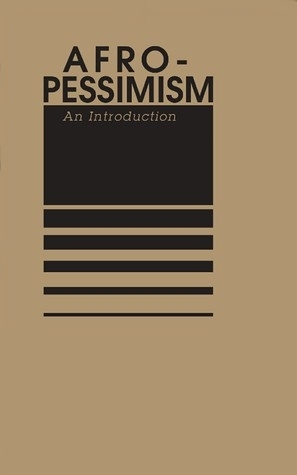
| Title | : | Afro-Pessimism: An Introduction |
| Author | : | |
| Rating | : | |
| ISBN | : | - |
| Language | : | English |
| Format Type | : | Paperback |
| Number of Pages | : | 180 |
| Publication | : | First published February 1, 2017 |
In the wake of uprisings and public outrage at the continual murder of Black people by the police, discourse is incrementally acknowledging racialized police violence and discrimination in all areas of society. Yet there is a fissure between the prescriptions offered to rectify these issues and the failure to bring that about. Afro-Pessimism offers an analytical lens to examine this gap and the ways in which society is structured through anti-Black racism. Afro-Pessimism: An Introduction is a collection of articles compiled for the purpose of offering an overview of this theory. The collected articles span three decades of thought and cover, in addition to police violence, topics ranging from the labor of Black women and the slave's transformation following the emancipation to the struggles of the Black Liberation Army and the elements of anti-Blackness in Indigenous struggles for sovereignty.
Afro-Pessimism: An Introduction Reviews
-

This book joins the populous set of "I am excited that something like this exists, and I want it to be a better version of itself." This is a project where someone(s) took texts out of academic journals and books and made them available for free and cheap, just because they wanted to share ideas they consider useful tools/weapons/etc. In many cases the original materials are either costly or behind those academia access walls. It's a kind of popularizing/radicalizing/pirating project, which I can really love. And I've been interested for a while (since reading a little interview Frank Wilderson did around the time of Ferguson) in getting more of an idea of Afro-Pessimist ideas, so when I found this in a local bookshop (for like $6 or so) I picked it right up.
There are a lot of good ideas in here, and also some pieces I couldn't get into. I wonder about the editor(s)' choices, for example "The Burdened Individuality of Freedom" (Saidiya Hartman) was a very frustrating read for me, like it was floating without its context; I wondered while reading if it was an excerpt and, yes, it turns out it's a chapter from Scenes of Subjection. Part of the idea is to get you to read more from each author you liked, but excerpting is tricky.
Also, a couple/few of these texts were heavily laden with jargon and tortured sentences. I can swallow a good bit of jargon, but at times while reading those texts I was not having it. Makes me wonder about form and content: is the writer using tortured prose to express ideas of suffering, born of suffering...? The jargon-heavy pieces were also the excerpted ones--Hartman and Spillers, if I remember right (it's been almost two weeks now). I just don't feel they work well for the purpose of introduction. Wilderson's and Sexton's pieces in here are much more intro material.
According to their blog, the publisher (Racked & Dispatched) is no longer shipping these out, but there are pdfs to download and print:
https://rackedanddispatched.noblogs.org -

Great intro - especially if you're trying to wrap your head around these pretty complex and intense concepts as a student!
-

An incredibly concise and cogent collection of essays that accurately reflects the stakes of AP's interventions in thought
-

I think this could be fruitful if used with the right intentions. There are aspects to this that I don’t agree with cause i think it’s divisive however there are understandings within that if applied correctly could foster clarity and unity. I have a love/hate relationship with this book, i like it because it makes me question but hate it for the same reason.






